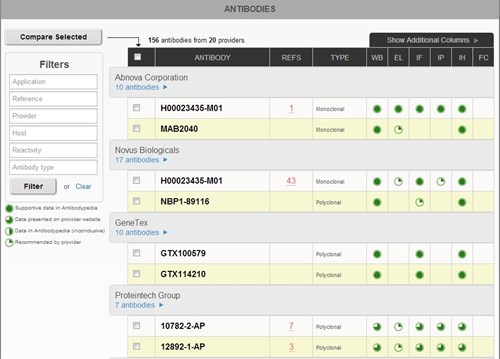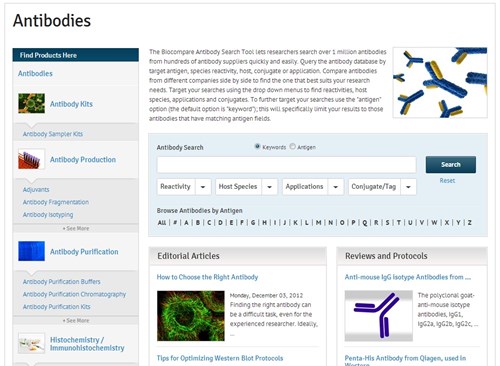Antibody Comparison Sites: How to Find Your Perfect Antibody Faster
Find Your Perfect Antibody Faster
Antibodies are indispensable biomedical research tools underpinning an ever-increasing number of bioassays. As such, it is hard to find a life science publication lacking any antibody-based technique in the present literature.
A wealth of biotechnology companies exist to provide these essential laboratory resources in pre-made form (reducing costs and acquisition times significantly). From hundreds of smaller vendors focusing production efforts on specific diseases to larger companies offering tens of thousands of antibodies, the market is saturated with commercially available immunoglobulins. Their numbers not only reflect their broad application in research, but also the unpredictability of scientific discovery ― the targets of tomorrow must also be readily available.
This abundance of antibodies, in theory, increases a researcher’s chances of finding an ideal one; however, in reality it can be a case of either “spoiled for choice” or “where do I start?”
Several antibody comparison sites have been established to address the need for convenient and informative searches of the antibody cornucopia. Search engines now return a variety of these 'catalogs of catalogs' in their results when you type in 'antibody', such as Antibodypedia.com, CiteAb.co.uk, AntibodyResource.com and Biocompare.com. These sites not only offer convenience, but some also provide validation information and user reviews up front so that you can browse antibody performance in one place ― but what does each one have to offer, and how can you benefit from them the most?
Antibodypedia
Antibodypedia, a relatively new addition to the comparison site compendium, is heavily focused on the user-review aspect of antibody comparison. Set up as a collaborative project between the Royal Institute of Technology in Stockholm, Sweden and Nature Protocols, it styles itself as a 'microjournal'*, reviewing its user submitted data before upload (though the site still has some way to go to reach the authority of its parent journal ― more on this later!) The site reviews information of approximately 568,865 antibodies sourced from 33 suppliers, covering 18,160 gene products. Searches of this vast vault of information are gene-centric, so all you have to do is type in the gene name of your target protein to obtain relevant results (see below).

Helpfully, the results immediately tell you the breadth of your search ― 156 antibodies from 20 suppliers in the case of TARDBP, a gene of interest for those investigating neurodegenerative diseases such as Alzheimer's. Basic information such as provider, catalog number and antibody type (polyclonal or monoclonal) are displayed, in addition to a summary of validation data for a variety of applications (represented by green pie charts). This visual overview is a great indication of which antibodies to begin considering for your shortlist, taking into account other information such as citation number and species reactivity. Looking at several Proteintech entries, this validation summary is accurate ― although you'll have to decide whether independent user data submitted to Antibodypedia warrants a full pie chart over the data on vendors' websites yourself (some, including Proteintech, display data sent in from experts based in relevant fields of research).
Other important and useful aspects of Antibodypedia are its ‘advanced search’ and its comparison feature which enable you to fine-tune your results. Want to find antibodies that are recommended for particular experiment or sold by a particular provider? You can use the 'Filters' feature to narrow your search down instantly. Additionally, the side by side comparisons allow researchers to look at the details of antibodies of interest in a much user-friendly way, compared with the time-consuming method of screening each option separately.
There are still a few creases to iron out with Antibodypedia, for example the double entry of the H00023435-M01 catalog number under two different suppliers above ― this is not necessarily a true mistake, just that the antibody is sold by both the original producer (Abnova Corporation) and a reseller (Novus Biologicals). Admittedly, this is not really a problem, it's just that both entries' validation data are inconsistent, so you'll have to adjust for any discrepancies in such cases. Another potential pitfall to be wary of is inaccurate citation information. In the example above Antibodypedia has misquoted the number of publications attributed to both Proteintech TARDBP antibodies ― in reality. Proteintech's TARDBP antibody (12892-1-AP) has notched up appearances in just under 100 publications, and its 10782-2-AP version has reached just over 1,000 citations! (a bit of a difference!) It highlights that it's worth double checking citation figures of promising candidates on the respective company's website. Another good advice is to use at least one other comparison site to balance your search...but which one?
CiteAb
Another upcoming, academia-based antibody comparison site is CiteAb, founded by Dr. Andrew Chalmers in the Department of Biology and Biochemistry at the University of Bath. The site has grown with support from ESPRC Knowledge Transfer Champion Funding and submission of information from antibody companies, Xenbase and CiteAb users. Currently, the CiteAb search now includes over 400,000 antibodies and its results are simply laid out and user-friendly. A great feature of this website is it puts a great emphasis on collecting publication data independently, so you can really rely on its citation information. Users can submit details of their own antibody-featuring publications to CiteAb, and the hope is to get most users to do this to cultivate a culture of contribution and up-to-the-minute sharing of information.
Antibody Resource
Antibody Resource is a comparison site that can trace its origins back to the 90s, and has since then been developed by scientists and antibody industry veterans to the website it is today ― merging the interests of both customer and supplier. It now caters for over 20,000 protein targets, coordinating data from over 1 million antibodies sourced from 75 independent vendors and features a number of useful navigational tools, such as a user-friendly matrix filter that scientists can use to find specific products quickly and easily (see image below).

Like Antibodypedia, Antibody Resource has all the basic data one would need to make an informed decision on choosing the right antibody. However, Antibody Resource goes one step further than other sites and actually displays images of data in its search results (they are the only site that does this at present), making it easier for you to view validation data on one single webpage.

Another useful feature of Antibody Resource is its popularity indicator bars, (see left of image above showing PAX8 search results) which are influenced by the browsing habits of your peers. This tells you what similar researchers are browsing and buying.
The only features missing from Antibody Resource search results are the peer-review aspect of comparisons and the option to compare a few results side-by-side. However, Antibody Resource has confirmed that it will be launching a user review feature very soon.
An important point to mention is that the Antibody Resource listings can be influenced by suppliers promoting their best antibodies, but the site assures users that no single antibody supplier can dominate its listings or search matches (which means no exclusive promotion a single company). This may seem to have the best interests of suppliers in mind, but this approach can benefit both user and supplier as it does away with alphabetical listings (so companies that begin with 'a' can't rest on that alone.)
Biocompare
Another comparison site you may find useful (if you are not using it already) is Biocompare, mainly because it covers such a vast amount of the antibody market and more (you can search for microscopes, cell culture products and much more). Clicking through the homepage to its antibody search, you can instantly see that Biocompare aims for user-friendly, simple layouts and has useful editorial sections. It produces the same basic results as the comparison sites above, however it lacks summaries of validation data and links to user-reviews, yet there is a separate product review section displaying independent product appraisals from researchers. Again it is worth noting that Biocompare allows suppliers to influence its listings, which is easily seen with the existence of a 'Sponsored Product' results section on certain searches.

A message from Proteintech: Do you have a favorite antibody search engine or a different search method? Proteintech want to hear about it! Tweet @Proteintech or respond to this post below
*A reference taken from Tool Tales: Antibodypedia - Searching for the Perfect Partner
This article was written as a collaboration between Proteintech Guest Blogger Harsh Amin and Proteintech Blog editor Deborah Grainger.




